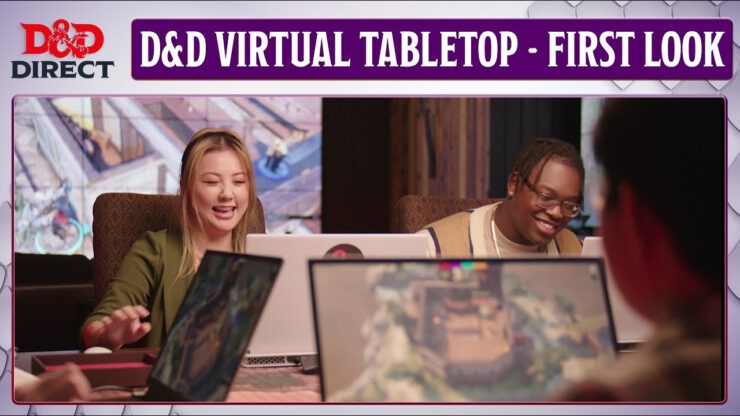The more I read about WotC’s plans for their upcoming virtual tabletop software, the more I understand what the whole OGL 1.1 was all about. I am also pretty sure that people in charge don’t know what they are doing. But before I share my further thoughts, let’s have a look at their vision of the future of D&D.
I have to admit, the software looks solidly built, is quite pretty to look at, and totally misses the point. The big strength of tabletop roleplaying games has always been that the world, the adventures, the stories are all in the players’ minds. To make combat easier maps and miniatures can be used, but those are optional. For a lot of people, TTRPGs can be quite immersive, just because we don’t have a physical reflection of what’s happening in the game. What the players and the GM imagine is probably much more awesome, exciting, scary, detailed, etc. than anything an artist may put to paper or onto a digital screen. I don’t mind having fancy maps, well-created handouts, but the action should happen in our minds, not on computer screens.
Here’s where the trouble with WotC’s VTT starts. It looks like a video game, it probably sounds like one as well, and it sure as hell also plays like one. Sure, it’s no Baldur’s Gate III, but we are getting close. There are animations for spells, highly detailed player character and NPC models (which you can probably dress up as you like – as long as you pay the required micro-transactions), and terrain which wouldn’t look out of place in any AAA-computer game title. For all intents and purposes it moves D&D pretty close to a video game and since it’s core of their monetization strategy it’s probably what WotC wants people to use in the future – online and offline. There might be a point in the future where new players believe that’s how TTRPGs are meant to be played.
I also don’t think it’s wise to use Unreal Engine 5 for a VTT. This software will probably not run on any old computer or smartphone and makes D&D less accessible to many people. Instead of just having a copy of the rules, some dice, paper and pencils, you’ll need a gaming PC and a high-end smartphone if you want to be a part of D&D’s future. Sure, the VTT looks pretty fancy, but it is wise to make it even harder to get into the hobby? Or perhaps this is just the first step. At some point the VTT might not be longer optional and when AI is a bit more mature, the service might even include virtual DMs, which you can subscribe for a monthly fee (of course). Who knows, perhaps D&D will just the brand name for some kind of MMORPG in the near future, while its TTRPG roots will be forgotten and perhaps even ridiculed.
Do I sound like a bitter old grognard? Yeah, probably. But that doesn’t make me automatically wrong. What sets apart TTRPGs from other games is that – at least in my opinion – the players’ imagination and immersion into the world – are essential. If you replace that by fancy computer game graphics something important may be lost. Don’t get me wrong. I also use a computer and/or smartphone as a GM or player. But the game itself is basically played just like in the 1970s. With VTT’s like the one WotC is working on right now, this might change forever.
What are your thoughts on the matter? Am I overreacting with all my talk of doom and gloom, or do you agree that WotC is on a wrong path? Please share your thoughts below.


You pretty much reflect my opinion that I’ve expressed several times in several places: D&D is going to remove itself from the TTRPG space. It will be something else, the worst of all worlds (imo): the lack of freedom and imagination of a video game, the slowness of a human GM, the micro-transactions-fuelled walled garden of an online ecosystem.
I disagree with you on one point, though: I don’t think the “TTRPG roots will be forgotten”. I’m pretty sure that TTRPGs will continue to thrive. Maybe even better than now, because the future D&D won’t be a substitute – nor a competitor – for them any more than video games already are and have been.
I think I should have explained better, what I meant with “its TTRPG roots will be forgotten”. I was talking about WotC’s D&D only, not about pen & paper roleplaying games in general. I am pretty sure TTRPGs will thrive for many years to come even if D&D is merely a brand name for something more akin to a video game.